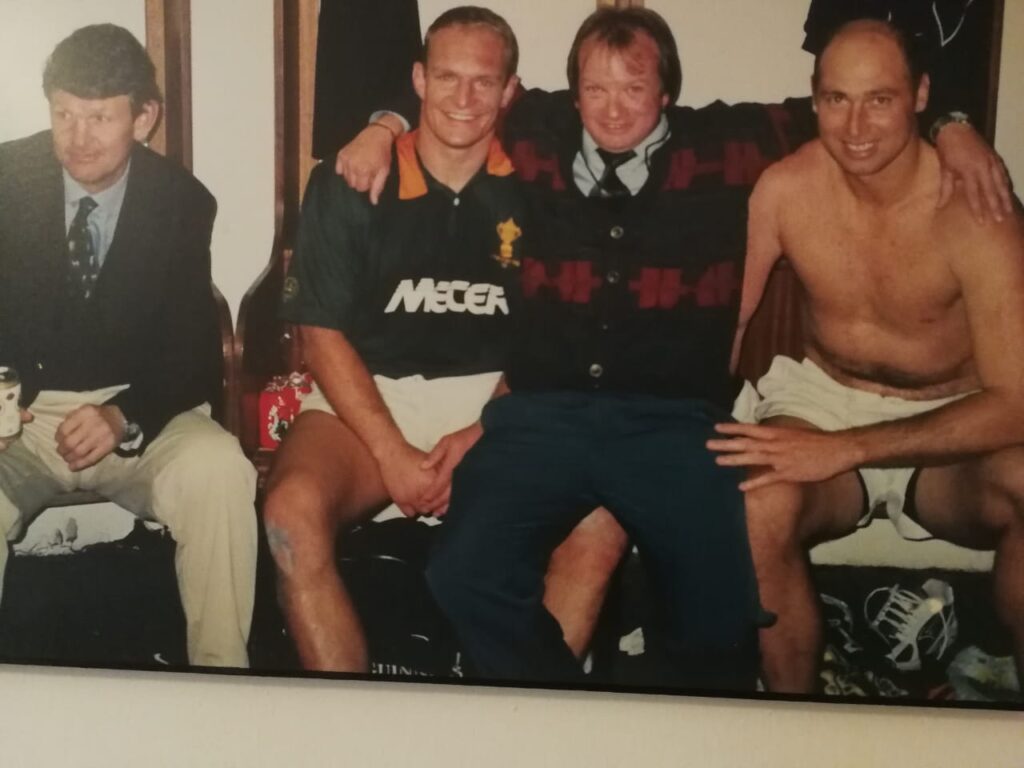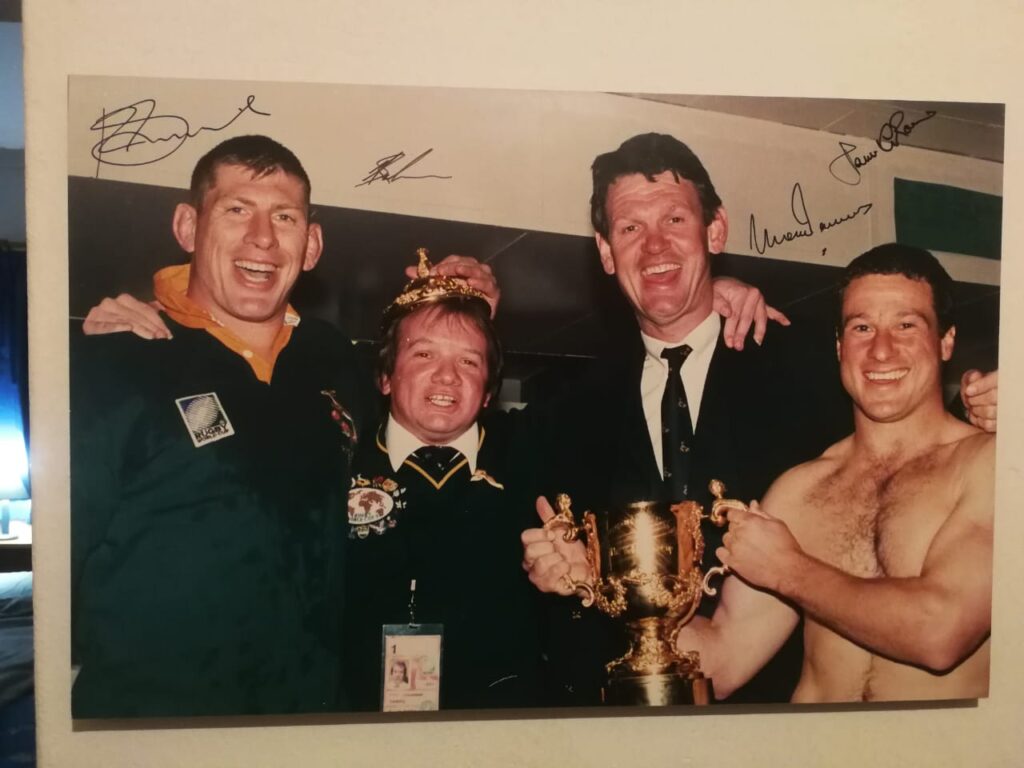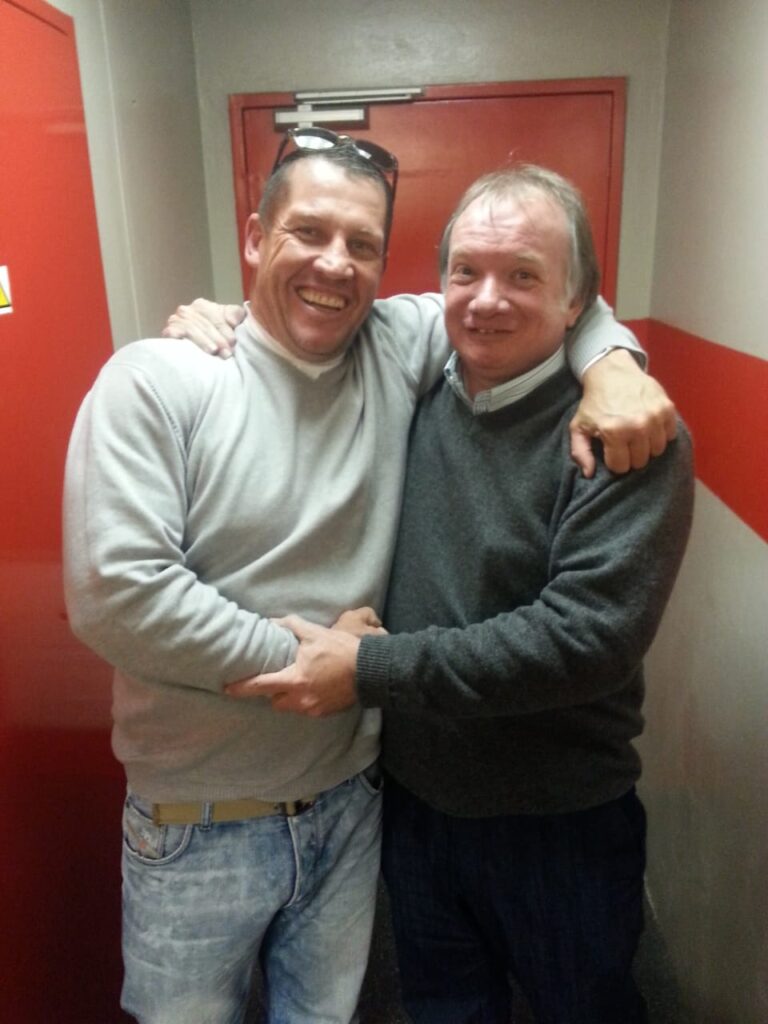
It’s not a long way from Boksburg to Ellis Park, but for Robbie Schlemmer, June 24, 1995, was no ordinary trip. As the boot and change room manager for the Springboks, he was heading into a day that would change South African sport forever, one polished boot, one quiet checklist at a time.
The build-up to a nation’s moment
Schlemmer remembers how he steered his trusty Toyota Corolla through the quiet, wintry streets of Johannesburg that morning. The city was still, but he felt the tension rising. At Ellis Park, South Africa’s great rugby fortress, all was calm. He knew the day would be special.
His job was simple in theory but meticulous in practice: set up the changeroom, make sure everything was perfect. Geyser on? Tick. Lights on? Tick. Clean and tidy? Tick. Soap? Tick. Toilet paper? Tick. Ice machine filled? Tick. Cold drinks and Castles? Tick. Snacks? Tick. Physio bed? Tick. Air conditioner? Tick.
Then came the sacred ritual: unpacking the socks, shorts and green and gold Springbok jerseys, each laid out beneath a name tag, match programme balanced neatly on top. The balls had to be pumped to exact IRB specifications: 9.5 to 10 pounds per square inch. If any boots looked shabby, out came the polish and brush. The manne had to look sharp.
Inside the inner circle
Schlemmer began working at Ellis Park in the late 1980s after a friend asked him to help out. He earned R85 per Saturday before tax. “The Transvaal players also got a koevertjie with their R800 match fee,” he recalls.
The changeroom had its fair share of characters. The most intimidating? Louis Luyt. After a loss, he was fearsome. But not to Hennie le Roux, the team’s sharp-tongued shop steward, and Luyt hated that. “An insidious personality,” wrote Luyt of Le Roux in his autobiography. “He turned out to be a true prima donna.”
James Small, by contrast, was a “great oke” who believed Schlemmer deserved more recognition. Big men like Kobus Wiese and Balie Swart treated him like gold. Wiese still messages him on his birthday.

“Johan Heunis was pure class, and Japie Mulder was always chirping, joking, smiling,” says Schlemmer. Francois Pienaar, the captain, even mentioned him in his autobiography Rainbow Warrior, calling Schlemmer “my most loyal supporter”.
Coach Kitch Christie once told him, only half-jokingly, that he was the Lions’ lucky charm: “They only lost twice when I was sick.”
The day that changed everything
As the 1995 Rugby World Cup approached, it slowly dawned on Schlemmer that he might be involved. When he received his official accreditation as “Change room manager,” it became real.
That afternoon, he was busy seeing to the players’ needs when a commotion broke out. He heard Nelson Mandela before he saw him.
“And then I knew, you could put your house on the Boks winning.”
Mandela’s arrival in the changeroom had been kept a state secret. Only security chief Rory Steyn knew. Even Doc Luyt had been kept mostly in the dark. Dressed in a Springbok cap and jersey with Pienaar’s number six on the back, Madiba moved along the line, greeting every person. He paused to speak Afrikaans to a ball boy. His security detail urged him on, but Mandela took his time.
He told the players not to win for him, or for themselves, but for their country. Pienaar followed with his own words about unity and opportunity.
“There was no way we could lose that day,” Schlemmer remembers.
Small listened to UB40 on his Walkman. Mulder cracked nervous jokes. Pienaar bounced on his toes like a coiled spring.

Victory, quiet celebration, and farewell
Schlemmer squeezed into a corner of the press box to watch the game. His nerves were frayed, but his belief never wavered. At halftime, he made sure the sandwiches were ready. After full-time, the Heinekens. The All Blacks, more reserved, asked for tea.
Pandemonium followed the final whistle. Reporters, photographers, hangers-on poured into the changeroom. Schlemmer looked on with quiet pride. He later drank beer from the Webb Ellis Cup, part celebration, part tribute to the Transvaal core who had become world champions.
When the Boks left for Gallagher Estate and the official dinner, Schlemmer stayed behind to clean up. In the All Blacks changeroom next door, he heard guitars: Josh Kronfeld and Zinzan Brooke strumming Maori songs, their defeat worn lightly.
Schlemmer stayed on until 2003, working with the SA U20s who won their own title under Jake White. Players like Fourie du Preez, Jean de Villiers, Clyde Rathbone and the late Swys Swart passed through his care.
And then it ended. The work dried up without explanation. Today, at 61, he works as a rep for a liquor company. He still loves his rugby – from a distance now – and has found new passion in boxing and MMA.
A legacy in the shadows
Today marks 30 years since that extraordinary afternoon. There will be no private celebration. For Robbie Schlemmer, being there was enough.
He doesn’t need medals or headlines. He helped hold together the team behind the team, one checklist, one pair of polished boots, one quiet presence at a time.







11 Responses
Robbie Schlemmer you legend. Proud to call you my mate for over 20 years.
Hear! Hear!
Robbie the legend…. he will always follow up a chat with his infamous words…. “I am only 10 digits away”. Love you biscuit
Robbie, you beaut. What a super story. Time for you to visit Benoni Northens Sports Club again. We miss you. Lockey
Robbie you are definitely a legend. From the days we worked together, your voice always made an impact, your comments always valid with applause. Special person you biscuit. Charlene
Robbie you are a true friend and a remarkable person love you lots my friend
Thank you for the kind words my friend, you have no idea how much I appreciate it.
Schlemmie, dis nou bakgat.
Great article about a great man!!!